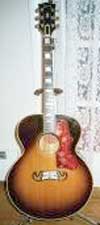
Back to Main |
Many players like older instruments. Once, this was because they were cheaper, but that's not true these days. Many musicians like the idea of playing an instrument that has been played by others. It's sort of a community feeling. Wooden instruments also age - their sound changes, sometimes quite dramatically over time. Some folks feel that older instruments, made with more hand-labor, were better crafted than the modern instruments that are made on assembly lines in factories. And for that reason, musicians who can afford it often buy custom-made or limited edition guitars built by luthiers. Many luthiers began as musicians who tinkered with and repaired their own instruments, learning their craft by practicing it. In the olden days, master instrument makers were often very secretive, jealously guarding their methods, techniques and formulas. Today, however, there is a growing community of builders, repairers, and restorers who are willing to exchange tips and techniques through the Internet. Basic Info Before you try your hand at working on an instrument, it's a good idea to have some basic idea of how the instrument works.The following are some sites that can give you basic information. (A word of caution: The science of acoustics, especially when applied to instruments, is more black art than engineering, in many ways. Don't expect to become an expert over night!) Repairers, rebuilders, etc. Now that you know how they work, here's some links to help you find out how to work on them. (Remember, when you're starting out, you probably want to practice on something cheap and expendable!) Parts |
